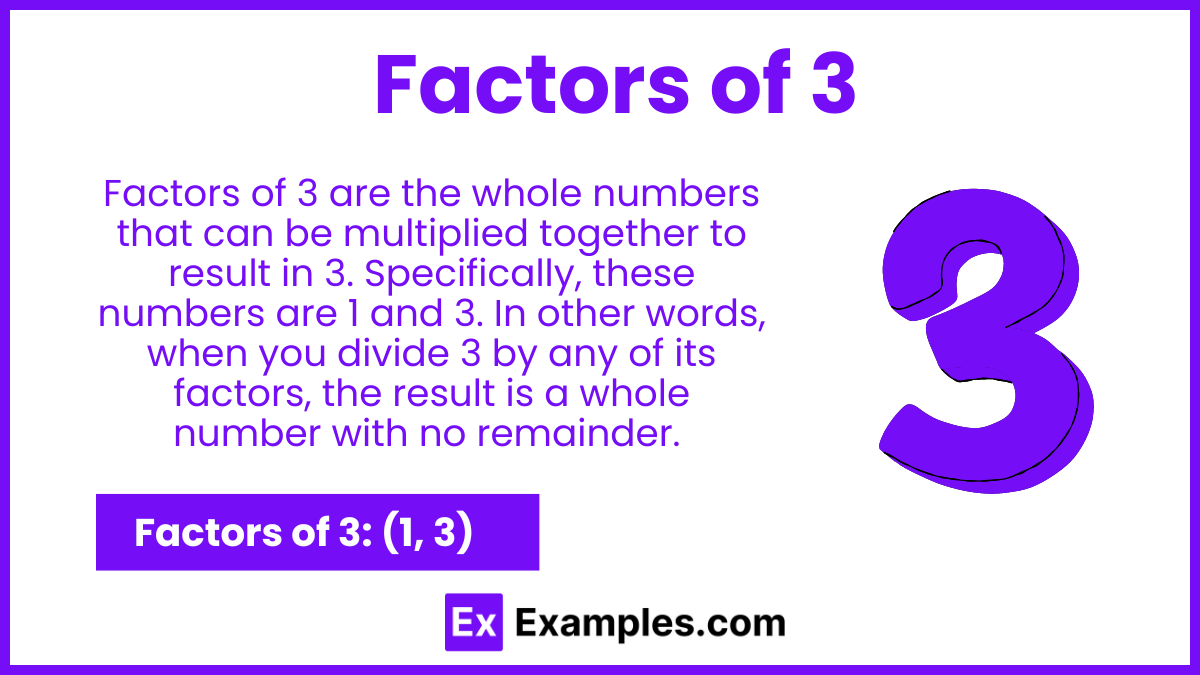Which of the following is a factor of 3?
2
3
4
5

The factors of 3 are the numbers that can be multiplied together to result in 3. Since 3 is a prime number, it has only two factors: 1 and 3. This means that 3 can only be divided evenly by 1 and itself without leaving a remainder. Recognizing these factors is crucial for simplifying fractions, solving equations, and performing various arithmetic operations. Whether you’re a student brushing up on basic maths skills or a math enthusiast, knowing the factors of 3 provides a solid foundation for further mathematical exploration.

The factors of 3 are the numbers that can be multiplied together to result in 3. Since 3 is a prime number, it has only two distinct factors: 1 and 3. This means that the only whole numbers that divide 3 evenly, without leaving a remainder, are 1 and 3. In other words, 1 multiplied by 3 equals 3 (1 * 3 = 3). Understanding that 3 is a prime number highlights its uniqueness, as prime numbers have exactly two distinct positive factors: one and the number itself. This concept is fundamental in various mathematical operations, including simplifying fractions, solving equations, and exploring number theory.
The factor pairs of a number are two numbers that, when multiplied together, give the original number. Since 3 is a prime number, it has only one factor pair.
This is the only factor pair for 3 because it is a prime number and has no other divisors. Understanding factor pairs is useful in various mathematical contexts, such as solving equations and simplifying expressions.
Calculating the prime factors of a number involves breaking it down into its basic building blocks, which are prime numbers. Here are the steps to find the prime factors of the number 3:
Prime Number: A prime number is a natural number greater than 1 that has no positive divisors other than 1 and itself. Examples include 2, 3, 5, 7, and 11.
Composite Number: A composite number is a natural number greater than 1 that is not prime. It can be divided by numbers other than 1 and itself.
To calculate the prime factors of 3, we first need to determine if 3 is a prime number.
A prime number has exactly two distinct positive divisors: 1 and itself.
Since 3 meets these criteria, it is a prime number.
Since 3 is a prime number, it has no prime factors other than itself.
The prime factor of 3 is: 3
To summarize, the number 3 is a prime number, and its only prime factor is itself.
What are the factors of 3?
To find the factors of 3, we need to find all integers that multiply together to give 3
1 × 3 = 3
Therefore, the factors of 3 are 1 and 3.
Is 2 a factor of 3?
To determine if 2 is a factor of 3, we need to check if 3 can be divided evenly by 2.
3 ÷ 2 = 1.5 (not an integer)
Since 3 divided by 2 does not result in an integer, 2 is not a factor of 3.
Is 3 a factor of 3?
To determine if 3 is a factor of 3, we need to check if 3 can be divided evenly by 3.
3 ÷ 3 = 1 (an integer)
Since 3 divided by 3 results in an integer, 3 is a factor of 3.
What are the common factors of 3 and 6?
First, list the factors of each number.
Factors of 3: 1, 3
Factors of 6: 1, 2, 3, 6
Common factors are the numbers that appear in both lists. The common factors of 3 and 6 are 1 and 3.
What is the greatest common factor (GCF) of 3 and 9?
First, list the factors of each number.
Factors of 3: 1, 3
Factors of 9: 1, 3, 9
Finding factors of 3 can be simple and quick if you know a few handy tricks. Whether you’re solving math problems or just curious about number properties, these tips will help you determine if a number is divisible by 3 with ease.
No, for a number to be a factor of 3, it does not matter if it ends in an even or odd digit. The key is whether the sum of its digits is divisible by 3.
Yes, the factors of 3 are always odd numbers. The factors of 3 are 1 and 3, both of which are odd.
Yes, using a calculator can help you quickly determine if a large number is divisible by 3. Alternatively, you can break down the number into smaller parts and check each part.
No, multiples of 3 are not necessarily factors of 3. Factors of 3 divide 3 without leaving a remainder, while multiples of 3 are obtained by multiplying 3 by other integers.
No, prime numbers other than 3 cannot be factors of 3. Factors of 3 are limited to 1 and 3 because 3 is a prime number.
The prime factorization of 3 is simply 3 itself. Since 3 is a prime number, it cannot be divided by any other numbers except for 1 and itself. Therefore, the prime factorization of 3 is 3.
No, 2 is not a factor of 3. A factor of a number divides that number exactly without leaving a remainder. Since 3 divided by 2 leaves a remainder, 2 is not a factor of 3.
The factors of 3 are 1 and 3. The sum of the factors of 3 is 1 + 3 = 4.
Text prompt
Add Tone
10 Examples of Public speaking
20 Examples of Gas lighting
Which of the following is a factor of 3?
2
3
4
5
What is the smallest factor of 3?
1
2
3
4
How many factors does the number 3 have?
1
2
3
4
Which number is not a factor of 3?
1
3
4
6
What is the product of all factors of 3?
3
6
9
12
What is the sum of all factors of 3?
2
3
4
5
Which of the following numbers is a multiple of the factors of 3?
5
6
7
8
Which number is both a factor of 3 and a multiple of 3?
1
3
6
9
What is the difference between the largest factor and the smallest factor of 3?
0
1
2
3
Which of the following numbers is a factor of 3?
1
2
3
4
Before you leave, take our quick quiz to enhance your learning!

